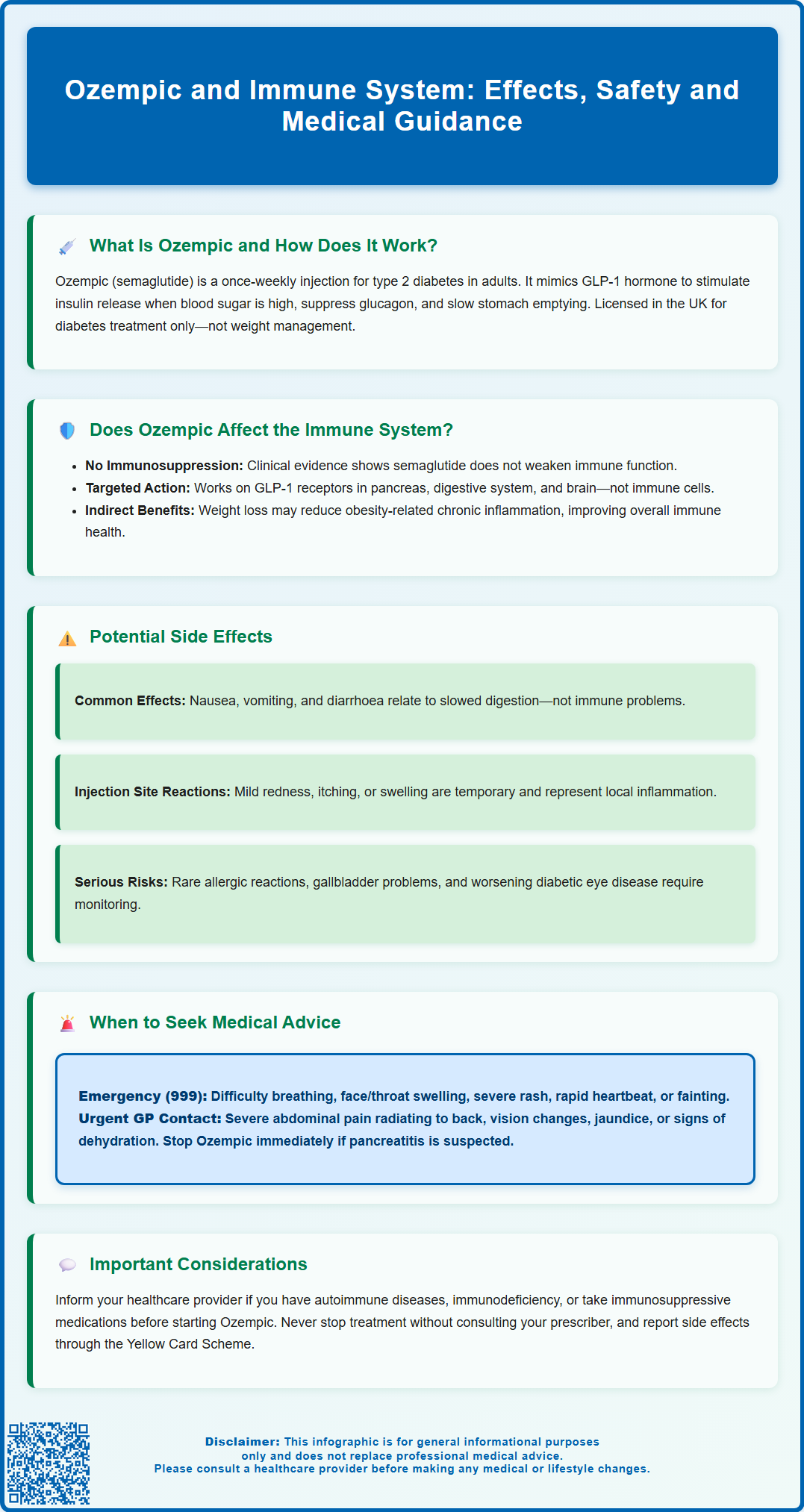Ozempic (semaglutide) is a glucagon-like peptide-1 (GLP-1) receptor agonist licensed in the UK for treating type 2 diabetes mellitus in adults. Administered as a once-weekly subcutaneous injection, it improves blood glucose control by stimulating insulin secretion, suppressing glucagon release, and slowing gastric emptying. Whilst many patients experience weight loss during treatment, concerns occasionally arise about whether Ozempic affects immune system function. This article examines the relationship between Ozempic and immunity, reviewing clinical evidence, potential immune-related side effects, and guidance on when to seek medical advice whilst taking this medication.
Summary: Ozempic (semaglutide) does not cause clinically significant immunosuppression and is not classified as an immunosuppressive medication.
- Semaglutide is a GLP-1 receptor agonist licensed in the UK for type 2 diabetes mellitus, administered as a once-weekly subcutaneous injection.
- Its primary mechanism targets GLP-1 receptors in pancreatic tissue and the gastrointestinal tract, not immune system pathways.
- Rare hypersensitivity reactions including anaphylaxis and angioedema have been reported and require immediate medical attention.
- Common side effects include gastrointestinal symptoms and injection site reactions, which do not indicate immune dysfunction.
- Patients with pre-existing immune conditions should inform their healthcare provider before starting treatment for appropriate monitoring.
Table of Contents
What Is Ozempic and How Does It Work?
Ozempic (semaglutide) is a prescription medicine licensed in the UK for the treatment of type 2 diabetes mellitus in adults. It belongs to a class of medications called glucagon-like peptide-1 (GLP-1) receptor agonists. Ozempic is administered as a once-weekly subcutaneous injection and is available in pre-filled pens.
Treatment typically begins with a 0.25 mg weekly dose for 4 weeks, which is an initiation dose to improve tolerability. The dose is then increased to 0.5 mg weekly, with possible further escalation to 1 mg or 2 mg weekly if needed for glycaemic control.
The medication works by mimicking the action of GLP-1, a naturally occurring hormone in the body that plays several important roles in glucose regulation. When administered, semaglutide binds to GLP-1 receptors in the pancreas, stimulating insulin secretion in a glucose-dependent manner—meaning it only triggers insulin release when blood sugar levels are elevated. This mechanism helps to reduce the risk of hypoglycaemia, although this risk increases when Ozempic is used alongside insulin or sulfonylureas.
Additionally, Ozempic suppresses glucagon secretion, a hormone that raises blood glucose levels, and slows gastric emptying, which helps to moderate the rise in blood sugar after meals. These combined effects lead to improved glycaemic control in people with type 2 diabetes. Many patients also experience weight loss whilst taking Ozempic, although it is important to note that Ozempic is not licensed for weight management in the UK (a higher dose formulation called Wegovy is specifically licensed for obesity).
Ozempic is typically prescribed alongside lifestyle modifications, including diet and exercise, and may be used alone or in combination with other diabetes medications such as metformin. According to NICE guideline NG28 (Type 2 diabetes in adults: management), GLP-1 receptor agonists like Ozempic are usually considered after first-line therapies have not achieved glycaemic targets. Ozempic is not indicated for type 1 diabetes or for the treatment of diabetic ketoacidosis.

Does Ozempic Affect the Immune System?
There is no evidence of clinically significant immunosuppression with semaglutide in clinical trials or in the UK Summary of Product Characteristics (SmPC). Semaglutide's primary mechanism of action targets GLP-1 receptors, which are predominantly found in pancreatic tissue, the gastrointestinal tract, and certain areas of the brain involved in appetite regulation. These receptors are not known to play a significant role in immune system function.
However, it is important to recognise that GLP-1 receptors are present on some immune cells, including macrophages and lymphocytes. Emerging research has explored whether GLP-1 receptor agonists might have anti-inflammatory properties, potentially reducing chronic low-grade inflammation associated with obesity and type 2 diabetes. Some laboratory studies suggest that semaglutide may modulate inflammatory markers, but these findings remain preliminary and have not been conclusively demonstrated in large-scale clinical trials.
Weight loss achieved through Ozempic treatment may indirectly benefit immune function. Obesity is associated with chronic inflammation and altered immune responses, so significant weight reduction can improve metabolic health and potentially normalise some immune parameters. This effect, however, is related to weight loss itself rather than a direct immunological action of the medication.
It's worth noting that nasopharyngitis (common cold) and upper respiratory tract infections can occur in patients taking Ozempic, but these are usually mild and do not indicate immunosuppression. If you have concerns about your immune health whilst taking Ozempic, particularly if you have a pre-existing immune condition, discuss these with your GP or diabetes specialist.
Potential Immune-Related Side Effects of Ozempic
Whilst Ozempic is not classified as an immunosuppressive medication, certain adverse effects reported in clinical trials and post-marketing surveillance may be of relevance to patients concerned about immune-related symptoms.
Common gastrointestinal side effects include nausea, vomiting, diarrhoea, and constipation, which occur in a significant proportion of patients, particularly during dose escalation. These symptoms are related to the medication's effect on gastric motility rather than immune dysfunction. Severe gastrointestinal symptoms can lead to dehydration and potentially acute kidney injury in susceptible individuals, so adequate hydration is important.
Injection site reactions—such as redness, itching, or swelling—occur in some patients and typically represent localised inflammatory responses rather than systemic immune problems. These reactions are usually mild and self-limiting.
Rare but serious hypersensitivity reactions, including anaphylaxis and angioedema, have been reported with GLP-1 receptor agonists. These are immune-mediated responses that require immediate medical attention. Symptoms may include difficulty breathing, swelling of the face or throat, rapid heartbeat, and severe skin reactions. Patients with a history of hypersensitivity to semaglutide or any excipients should not use Ozempic.
Nasopharyngitis (common cold) and headache are common side effects that do not indicate immunosuppression. These are typically mild and resolve without specific treatment.
Other important safety considerations include the risk of gallbladder problems (cholelithiasis, cholecystitis) and potential worsening of diabetic retinopathy, particularly in patients with pre-existing retinopathy who experience rapid improvement in blood glucose levels.
When Ozempic is used in combination with insulin or sulfonylureas, the risk of hypoglycaemia increases, and dose adjustments of these medications may be necessary.
When to Seek Medical Advice About Ozempic and Immunity
Patients taking Ozempic should be vigilant for symptoms that may indicate adverse reactions requiring medical assessment. Immediate medical attention is necessary if you experience signs of a severe allergic reaction, including:
-
Difficulty breathing or swallowing
-
Swelling of the face, lips, tongue, or throat
-
Severe skin rash, hives, or itching
-
Rapid heartbeat or dizziness
-
Feeling faint or losing consciousness
These symptoms may indicate anaphylaxis, a medical emergency requiring urgent treatment. Call 999 or go to A&E immediately if you suspect anaphylaxis.
Contact your GP or diabetes specialist if you develop:
-
Persistent or severe injection site reactions that worsen over time
-
Unexplained fever, particularly if accompanied by other symptoms
-
Symptoms of pancreatitis: severe, persistent abdominal pain that may radiate to the back, often accompanied by nausea and vomiting. If pancreatitis is suspected, stop taking Ozempic and seek urgent medical assessment
-
Signs of gallbladder problems: persistent pain in the upper right abdomen, fever, yellowing of the skin or eyes (jaundice)
-
Any changes in vision, which could indicate worsening of diabetic retinopathy
-
Severe gastrointestinal symptoms leading to dehydration (excessive thirst, reduced urination, dizziness)
If you have a pre-existing immune condition (such as an autoimmune disease or immunodeficiency), or if you are taking immunosuppressive medications, inform your healthcare provider before starting Ozempic. Whilst there is no established contraindication, your clinician may wish to monitor you more closely.
Patients should also report any new or worsening symptoms that concern them. The Yellow Card Scheme, operated by the MHRA, allows patients and healthcare professionals to report suspected side effects, contributing to ongoing medication safety surveillance. Never discontinue Ozempic without consulting your prescriber, as abrupt cessation may affect your diabetes control, except in cases of suspected pancreatitis where immediate discontinuation is advised.
Scientific References
- Ozempic 0.5 mg solution for injection in pre-filled pen - Summary of Product Characteristics.
- Ozempic - European Public Assessment Report.
- Type 2 diabetes in adults: management - NICE guideline NG28.
- Glucagon-like peptide-1 receptor: mechanisms and advances in therapy.
- GLP-1/GLP-1R axis: from metabolism (obesity and T2DM) to immunity.
Frequently Asked Questions
Does Ozempic weaken your immune system?
No, there is no evidence that Ozempic (semaglutide) causes clinically significant immunosuppression. Its mechanism of action targets GLP-1 receptors primarily in pancreatic and gastrointestinal tissue, not immune pathways.
Can Ozempic cause allergic reactions?
Yes, rare but serious hypersensitivity reactions including anaphylaxis and angioedema have been reported with Ozempic. Symptoms such as difficulty breathing, facial swelling, or severe skin reactions require immediate medical attention.
Should I tell my doctor about immune conditions before taking Ozempic?
Yes, inform your healthcare provider if you have a pre-existing immune condition or take immunosuppressive medications. Whilst there is no established contraindication, your clinician may wish to monitor you more closely during treatment.
The health-related content published on this site is based on credible scientific sources and is periodically reviewed to ensure accuracy and relevance. Although we aim to reflect the most current medical knowledge, the material is meant for general education and awareness only.
The information on this site is not a substitute for professional medical advice. For any health concerns, please speak with a qualified medical professional. By using this information, you acknowledge responsibility for any decisions made and understand we are not liable for any consequences that may result.
Heading 1
Heading 2
Heading 3
Heading 4
Heading 5
Heading 6
Lorem ipsum dolor sit amet, consectetur adipiscing elit, sed do eiusmod tempor incididunt ut labore et dolore magna aliqua. Ut enim ad minim veniam, quis nostrud exercitation ullamco laboris nisi ut aliquip ex ea commodo consequat. Duis aute irure dolor in reprehenderit in voluptate velit esse cillum dolore eu fugiat nulla pariatur.
Block quote
Ordered list
- Item 1
- Item 2
- Item 3
Unordered list
- Item A
- Item B
- Item C
Bold text
Emphasis
Superscript
Subscript












